Little Snow White: Part 3 (Conclusion)
A Fairy Tale
Little Snow White: Part 3 (Conclusion)
Standing on the royal balcony, the wicked queen executed a slow and seductive tergiversation that inflamed the male spectators below. Scores of top-hats rose in the air, some landing at her feet. In a sportive mood, she bent to retrieve these, flinging them back so forcefully and haphazardly that her bodice laces snapped and she turned away again in demure to rectify what had been an intentional mishap.
She massaged the nape of her neck. It was as if the tumultuous applause were not only a heavy burden but a well-nigh unbearable one. And in truth her joints ached, after having spent the early part of the afternoon murdering Little Snow White before sprinting back to the castle on all fours like a tigress.
She leaned against the verde-antique balustrade, peering wantonly at the peerless image reflected back at her from the leaded glasses of the closed portafinestra. Despite her happiness, she felt a twinge of regret. For there was no longer any object in fairyland (aside from her reflection) to vie with her in grace and beauty.
But even as she pondered this, her brows contracted at the realization that an unprecedented event was unfolding behind and below her. A gradual and marked de-escalation in the effusiveness of the praise soaring up from the masses. Looking over her shoulder, she gasped and wheeled around. The crowd had begun to disperse.
Beneath the silken umbrage of fringed parasols, frisky fae-folk trod in pairs toward the public gardens to find a secret grotto where they might engage in a chaste assignation or satisfy with fairy grunts a seedy need. Others, feeling the day’s entertainment had run its course, checked their fob watches and brisked their pace to the clubs, casinos, and coffeehouses that abounded in the town beneath the castle. Straddling his papa’s shoulders, a boy hoisted a particolored lollipop in one hand as he waved farewell to the flabbergasted queen with the other.
Something has caused them to act in this irrational manner. She returned to her dusky apartments, negotiating the mazy warren of plush and unlit corridors until her lightsome steps brought her to her secluded and inviolable boudoir. Once seated at the dressing table, she picked up her magic mirror and (eyes asquint) addressed it, saying, “Little mirror in my hand, who’s the fairest in the land.”
And the mirror said:
“Though in fairyland your beauty is rare, beyond seven hills, where seven dwarfs dwell, is a girl whose beauty is much more fair: Little Snow White. Only truth may I tell.”
The chair toppled as she rose. Placing the mirror (glass-down) in a felt-lined drawer, the queen hissed: “I shall kill Little Snow White, even if I lose my own life in doing so!”
In the castle’s highest tower was her laboratory, where, amid the billowing fumes of boiling cauldrons and the din of bubbling retorts, she created an apple containing black seeds distilled from the noxious essence of a peach pit. Encasing the poisoned pulp in a mottled red-and-white rind, she placed it in a basket containing with seven ripe ones and returned down the spiral staircase.
That night she lay supine in her bed, contemplating the silken canopy above, which rose and fell with her heaving breaths, as she hatched a scheme worthy of the Evil One himself. Next morning, she disheveled her hair and took the ashes from cold fire grate, smearing these on her face to alter her appearance.
Donning a black hooded robe, she grabbed the basket of apples and exited the castle gate as the first glimmers of dawn broke on the eastern horizon. Within an hour she was in the enchanted forest hiding behind a tree and the seven dwarfs were walking out of their cottage and saying farewell to Little Snow White.
An evil influence exuded from her skin and sicklied over the environing flowers, withering the leaves on the stately branches. She waited until midday before knocking on the seven dwarfs’ door.
Little Snow White answered, looking up at the hooded woman. “Who are you?” she asked.
“A peasant. One who earns her living selling apples I pluck from a tree close by. May I come in?”
“I’m afraid I’m no longer allowed to let anyone inside.”
“I see,” the woman replied, setting the basket down. She bent down and reached inside. “If I can’t come in, will you come out? I would like to give you a gift, my dear.”
“A gift?” the girl asked, stepping out of the cottage.
The woman tilted her head back, and Little Snow White saw the yellow eyes blazing under the flap of her inky cowl.
“An apple,” the peasant woman said, clutching the fruit with both hands. “As red as blood, as white as snow, with seeds as black as ebony.”
The seven dwarfs had warned Little Snow White to be careful about accepting gifts from strangers. So she asked: “Will you take the first bite?”
“Of course,” the woman replied, anticipating the request. It was only the pulp beneath the red part of the rind that was poisoned. Biting into a patch of white, the queen chewed it and swallowed. “Mmm. It’s so sweet. So innocent.”
“What?” the girl asked.
The queen thrust the apple into the child’s hand. “Taste it, my dear.”
Little Snow White bit into the red rind. Immediately, her eyes began to droop. She dropped the apple and clutched at her throat, falling backwards onto the cobbled path. She could no longer move. And within seconds, her eyes closed and she lay inert.
Her wicked stepmother bent down and picked up the poisoned apple: “As red as blood as white as snow, with hair as black as ebony.” She slipped the poisoned fruit into her cloak and kicked the basket with the seven innocuous ones aside. “The dwarfs will not be able to revive you this time!”
Spreading her feathered arms, she slowly ascended into the air, laughing. But the sound turned to the croak and caw of a crow. Flapping her black wings, she flow over the treetops, then over the seven hills. She was so pleased by what she had done that she forgot to walk on two legs until she reached the gate of the castle.
In her boudoir, she removed the magic mirror from the drawer, and said, “Little mirror in my hand, who’s the fairest in the land.” The mirror replied in a downcast voice: “You are the fairest in the land.” When the queen heard this, she laid down the mirror. Her jealousy had been appeased. It was as if Little Snow White had never lived.
That night, the seven dwarfs returned from the mountain and were confronted by the saddest spectacle they had ever seen in their lives. Little Snow White was not breathing. In an effort to revive her, they loosened her staylaces, combed her hair, and washed her body in white water and red wine. But all to no avail.
They searched for what might have poisoned her. But found only the overturned basket of ripe red apples. Each dwarf ate one; and when none of them grew sick or died, they deduced that the apples were not what had killed their dear friend.
The thought of burying Little Snow White in the ground was too terrible for them to contemplate. So they built a glass-lidded coffin and placed her body inside it. They carried it up into the mountain and found a beetling rock shelf on which to deposit it.
Each morning on their way up, they stopped to say their hellos; and each evening on their way down they stopped to say their goodbyes. After many days of doing this they noticed that Little Snow White’s skin had not corrupted, nor had the blush left her cheeks. It was as if she were sleeping, though she was still not breathing.
The wild animals of fairyland (the owls, rabbits, foxes, wolves, ravens, and pards) kept watch over Little Snow White. And the susurrating elves that hid in the mountain’s thin air chanted magic words, which formed phrases that meant the same thing no matter which way the winds blew; and, by these incantations, a lasting truce prevailed among all God’s creatures that came near the glass-lidded coffin. Both predator and prey prayed together; together prayed prey and predator both.
The seven dwarfs made a plaque emblazoned in golden letters, which they placed at the head of the coffin. It told the sad tale of Little Snow White. And many years later, on a misty morning, as they climbed the mountain on their way to the mine, they saw a young prince standing apart from his attendants, reading the plaque.
When he heard the dwarfs, he wrung his hands together, and, in a faltering voice, said, “Let me take the coffin with me. I will give you everything that I have.” But the dwarfs replied, “We would not give away the coffin for all the treasures on earth.”
The prince sobbed and fled to his attendants, who consoled him. When he could speak again, he covered his eyes and said, “If you will not sell the coffin, give it to me as a gift. For now that I have seen Little Snow White, I cannot live without her.”
The young man’s fervor moved the dwarfs, who went to a nearby cave where they conferred with one another. Having finished their standing conclave, they went to the prince, and acceded to his proposal, deeming it an honorable one. In gratitude the young man shook each dwarf’s hand. And his attendant went to the coffin to bear it away.
But one man slipped and the coffin fell, shattering the lid. The body of Little Snow White tumbled out and landed hard on the moss rocks. But the impact had caused a fragment of the poisoned apple, which had been lodged in her gullet, to be expelled from between her lips. And when this happened, Little Snow White began to breathe again.
Crouching on the moss and broken glass, the prince lifted the girl’s head. When she opened her eyes, the prince saw reflected in her irises a beautiful woman who seemed to be standing behind him. But when he turned to look, there was no one there.
Little Snow White saw his confusion and spoke: “I know you are a good, because the woman behind you told me.”
“Is she your mother?” the prince asked.
“Perhaps. Or a Holy Mother greater even than my own.”
Tears sprang into the prince’s eyes. “Will you be my wife?”
Little Snow White nodded. “I shall love and cherish you until Death sunders the bond between us.”
The young prince kissed her brow. And when they returned to his castle, they were married.
Not long after that, the wicked queen was in her boudoir preparing for a night at the opera. She stood before the three-way mirror, but could not see the back of her priceless gown.
She fetched her magic mirror; and, holding it slightly above her heard, was able to study her perfection from multiple angles. In a whimsical mood, she said: “Little mirror in my hand, who’s the fairest in the land?”
And the mirror said:
“Although your beauty is indeed quite rare, the new princess who’s arrived on the scene possesses a beauty that’s much more fair— fairer even than yours, my dearest queen.”
From the louche and tattered box in the theater, which the ushers had inexplicably conducted her to, the fuming queen strained her eyes (through gemmed opera glasses) in an effort to see the new princess. But the lithy profile of the foppish prince continually obtruded itself between her and the unglimpsed object of her envy.
Somehow, the newlyweds had secured the opulent stage gallery that had always been reserved for her use alone.
Throughout the portly Aida’s interminable arias, the queen’s fingers deftly worked the dials of the jeweled magnifier, whose witchy lenses harnessed the scattered shards of illumination cast off the stage and enabled her to see everything in the gilded auditorium as if it were noon, even though the candles of the massive chandelier overhead were doused.
Returning to her boudoir that night, she disrobed and went to her dressing table. In an access of rage, she picked up the hand mirror and dashed it to pieces. The mirror wept as the tiny glass fragments fell like tears on the thick carpet, which had begun to grow a thick rancid scurf of mold and mildew.
Next morning, the king read aloud to his disinterested wife a glowing review of the previous night’s performance. A bell tinkled, a footman stepped in. He bore an envelope on a salver, which was addressed to the royal couple. The envelope contained an invitation to a ball the following week to celebrate the prince’s marriage to what the embossed letter alleged was “the fairest creature in the land.”
The wicked queen (escorted by her pointless husband) mounted the wide alabaster steps that led up to the prince’s palace. She handed the invitation to the bellman, who, uncrumpling it, announced their advent.
Waltzers whirled out of the way, as the king and queen of fairyland processed deeper into the room.
The bumbling king, wearing a red sash over his white uniform (pince-nez perched on the tip of his nose), waggishly buttonholed silver-haired men he had never met and reminded them of boyish antics they had supposedly engaged in together as lads. The queen scanned the room, searching for the couple, and felt a mounting unease.
There was something awful in the way the guests recoiled at her approach. Formerly-fawning baronesses now concealed their over-rouged faces behind painted fans, as bluff duke and gay blades, who had toasted her at every banquet and occasion in fairyland, now averted their eyes as if she were a demimonde.
But when they reached the center of the ballroom and the crowd had melted away, a frisson of horror ran up the queen’s spine. Wearing their tiny swallow-tail coats, the seven dwarfs stood next to the prince’s new wife: Little Snow White.
The wicked queen shook her head incredulously, as the prince’s guards seized her by the arms and dragged her away from her bewildered husband.
“No!” she cried out. “Please! Don’t!”
The prince went to the king and explained the matter to him. On hearing the truth, the broken-hearted monarch removed his pince-nez, shook his head in dismay, and never looked at his wife again.
A wooden platform had been carried into the room and placed on the floor. Smoldering on the slats was a pair of white-hot slippers forged of iron. The queen was lifted up and carried onto the cracking boards; and her feet were forcibly squeezed into the shoes.
She screamed as the pads of her feet oozed away and fused to the searing and now sizzling metal. Staggering from the platform, she stomped round the parquet floor, flailing her arms in the air and pirouetting so dramatically that the conductor struck up the orchestra and played lively rendition of “The Blue Danube.” The stench of scorched flesh was overpowering.
The queen’s knees buckled, and now she walked like a woman in labor. This elicited a ripple of cruel titters from the other aristocrats, who were enjoying her dethronement and hilarious execution. But the seven dwarfs, who did not like to see anyone in pain, lowered their eyes, plucked lint from their suits, and wanted only to go back to their cottage.
The prince went to his wife, who remained expressionless through it all. Little Snow White, who had suffered so much at the hands of her cruel stepmother, felt neither joy nor sorrow in witnessing her downfall.
Behind the seven-year-old princess hovered the spirit of the woman she had seen in the mountain. The apparition spoke in a voice just above a whisper: “As red as blood, as white as snow, with hair as black as ebony. All glory is to God, my daughter. The scales of justice have been balanced once more. And a great wrong has been set right.”


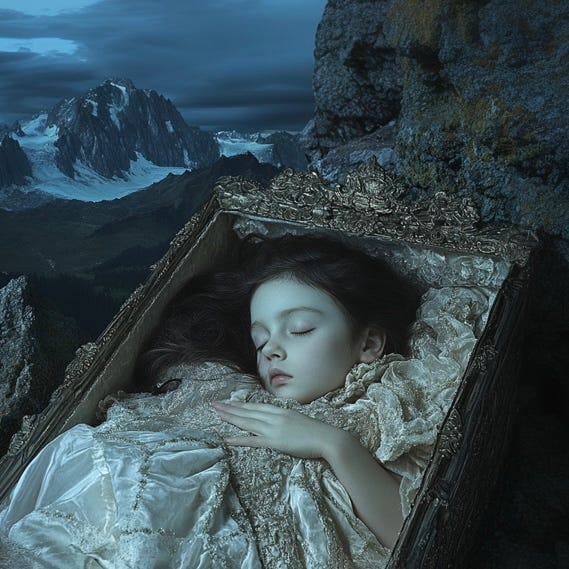
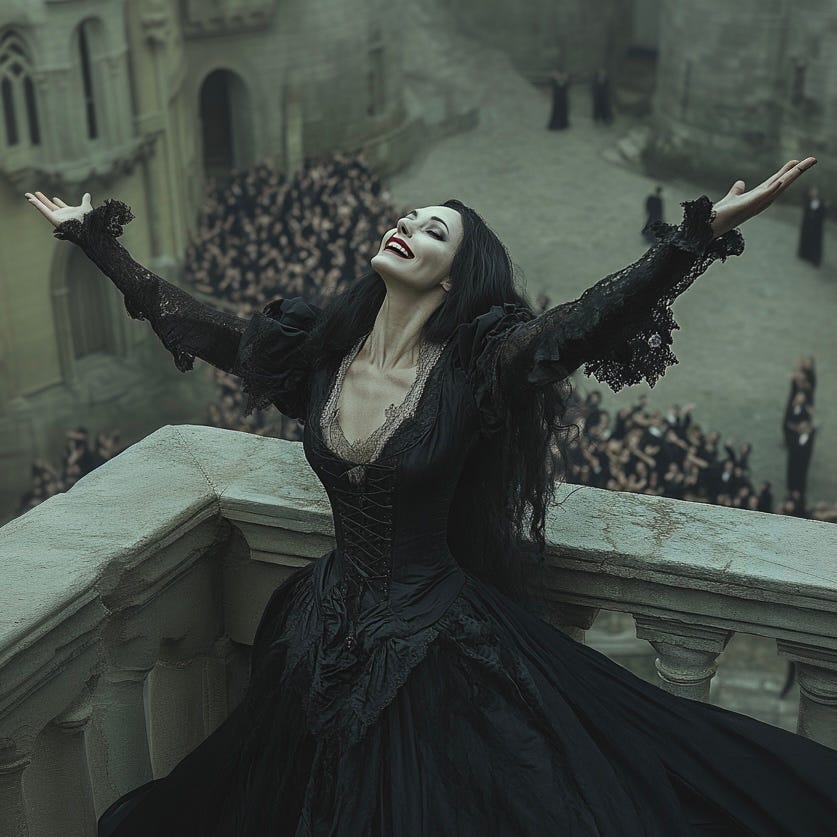
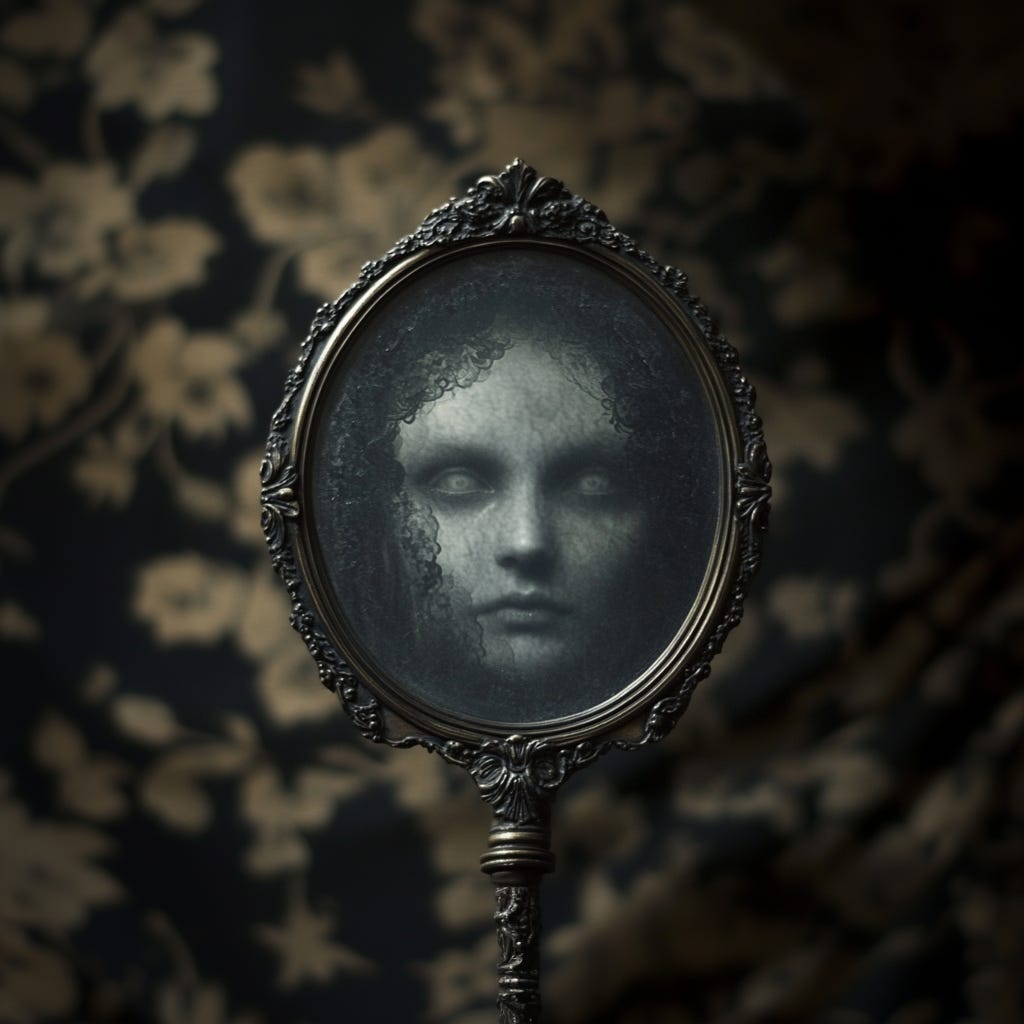
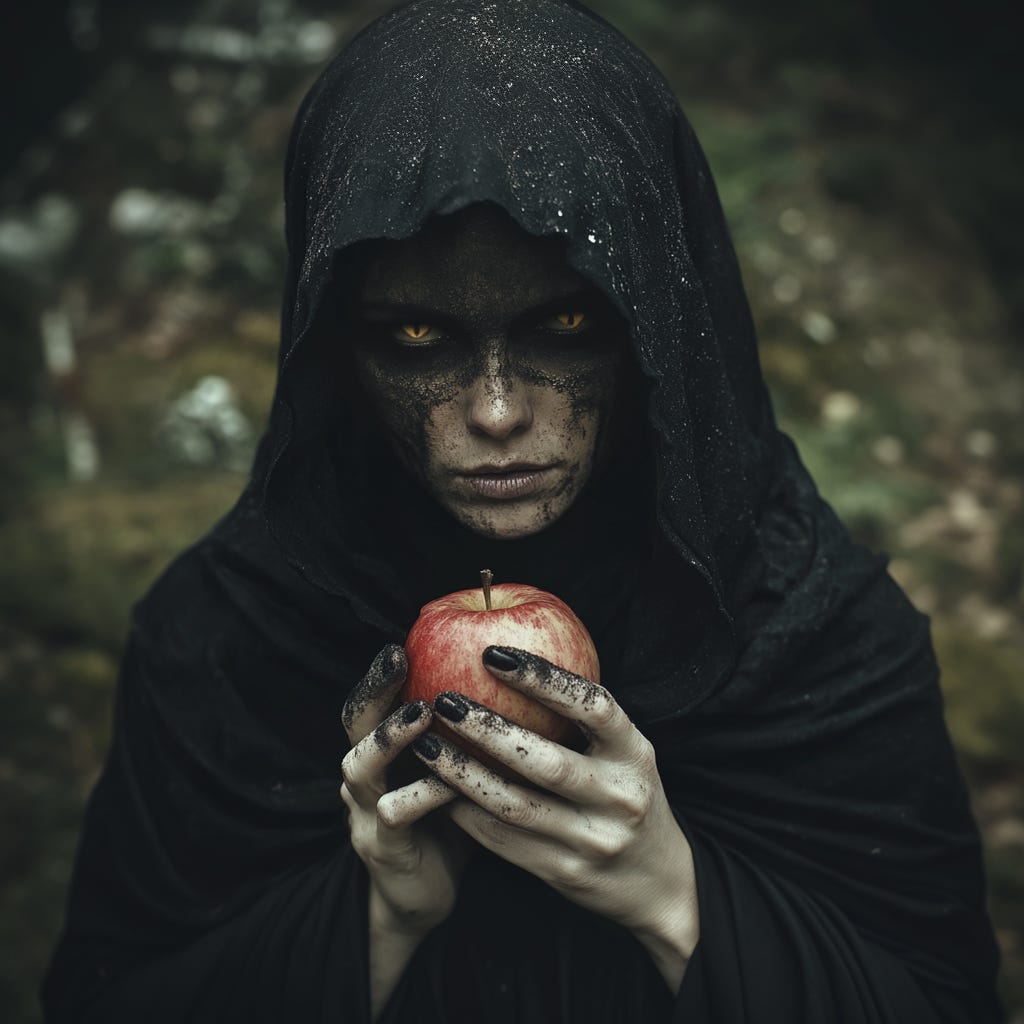
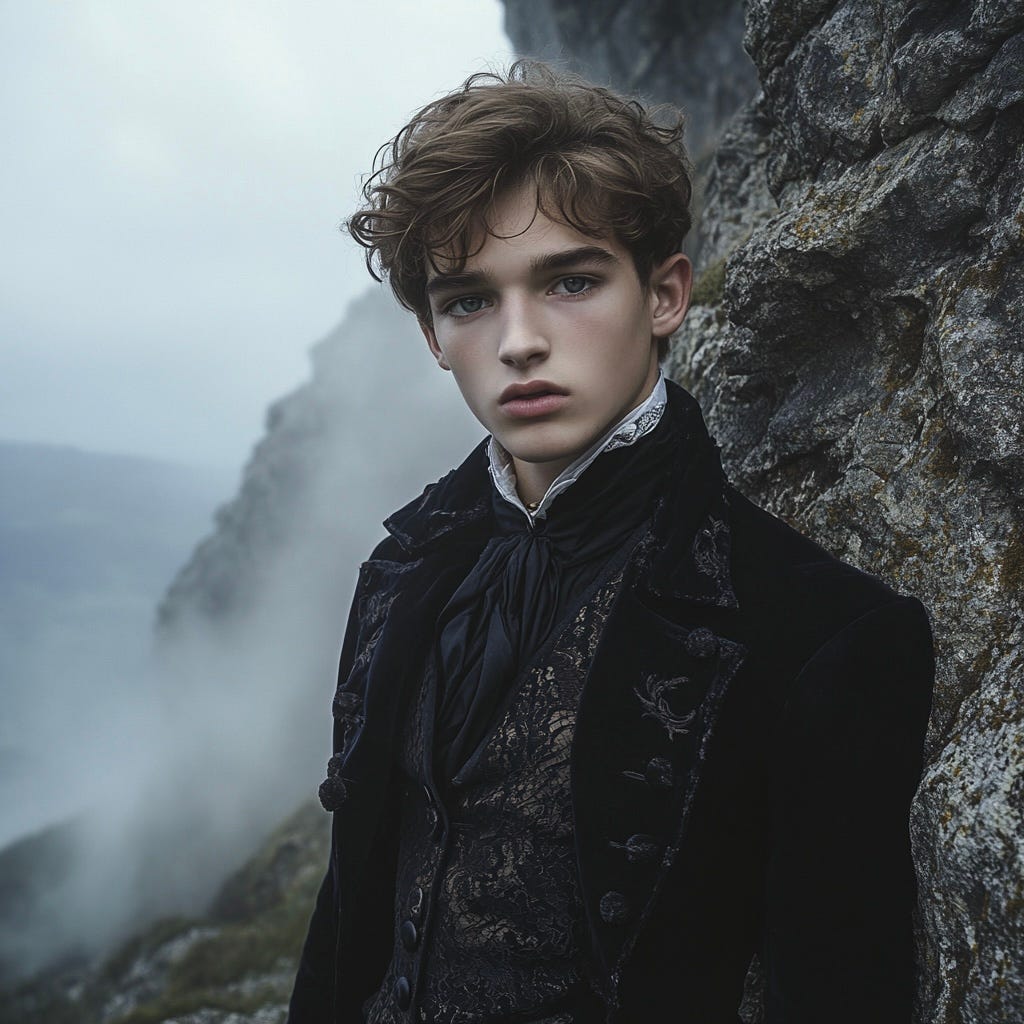
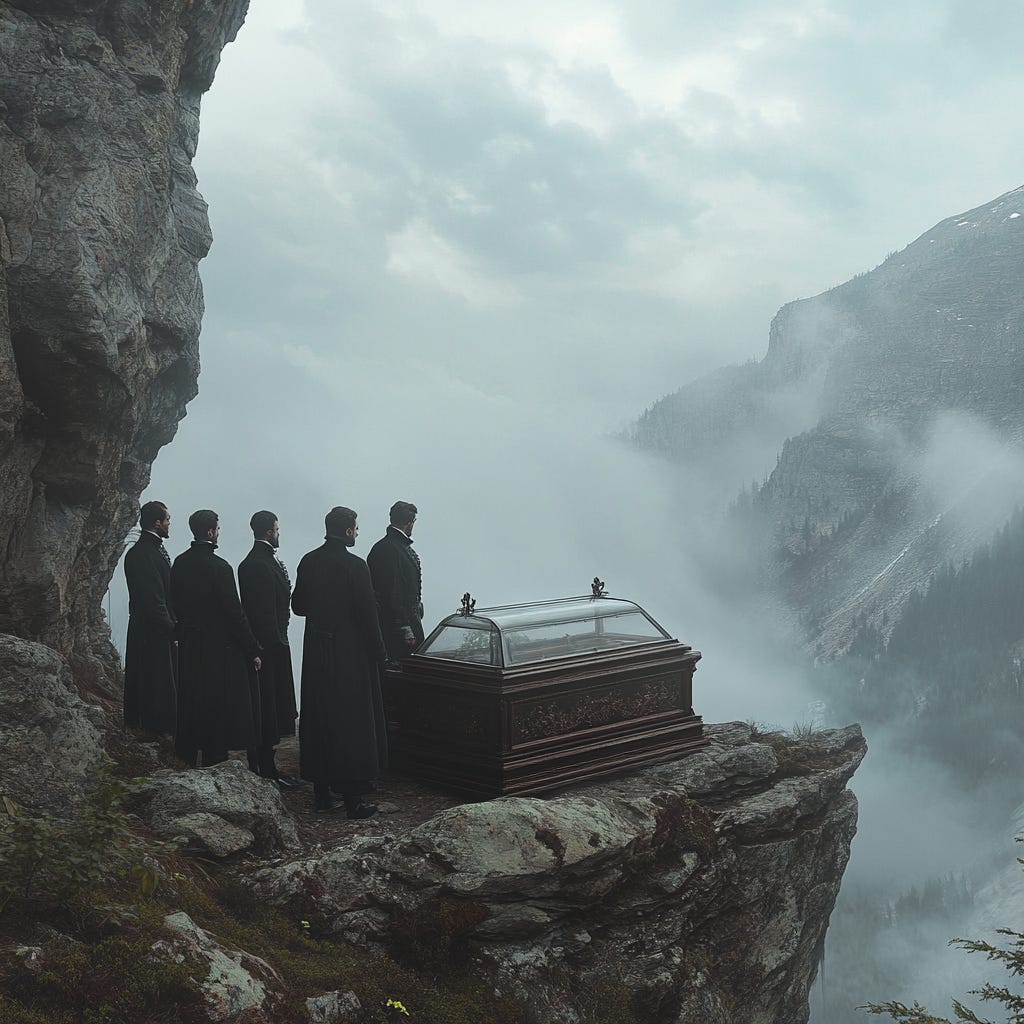
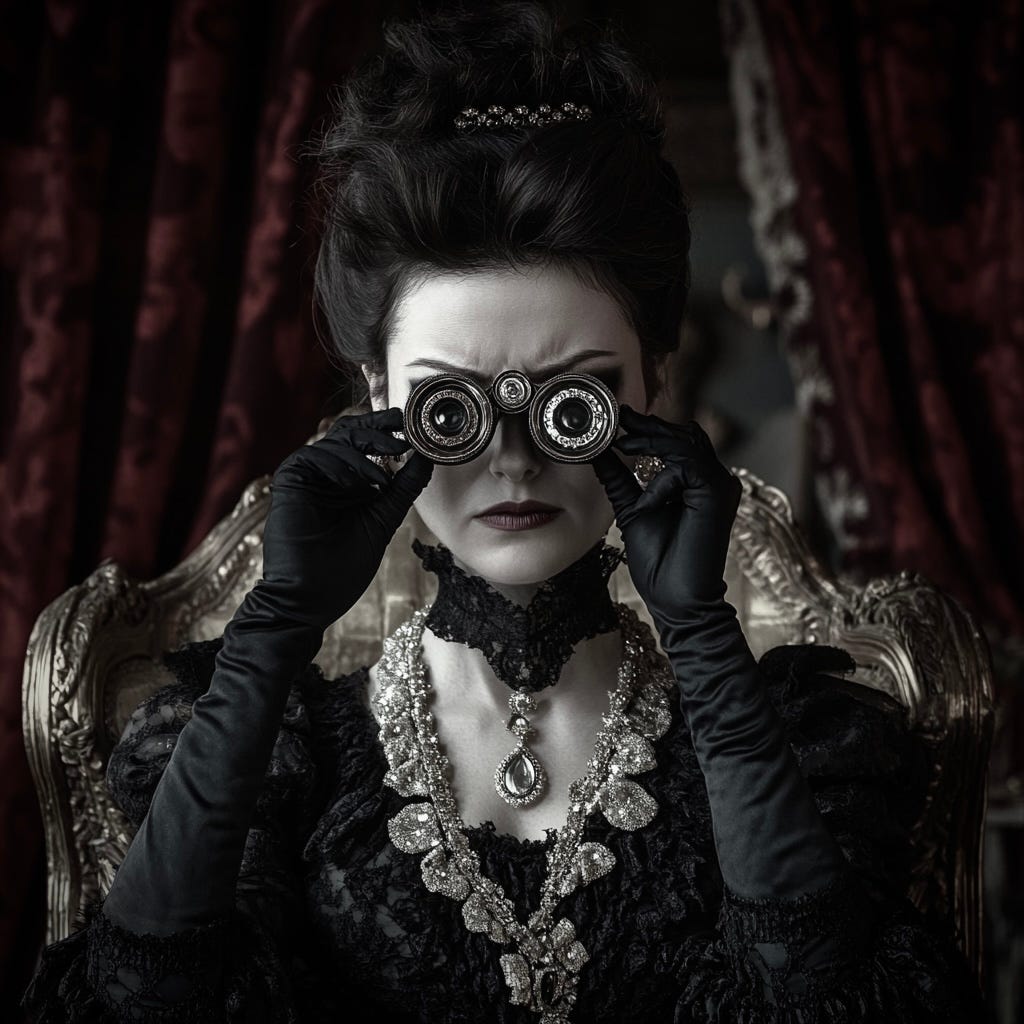

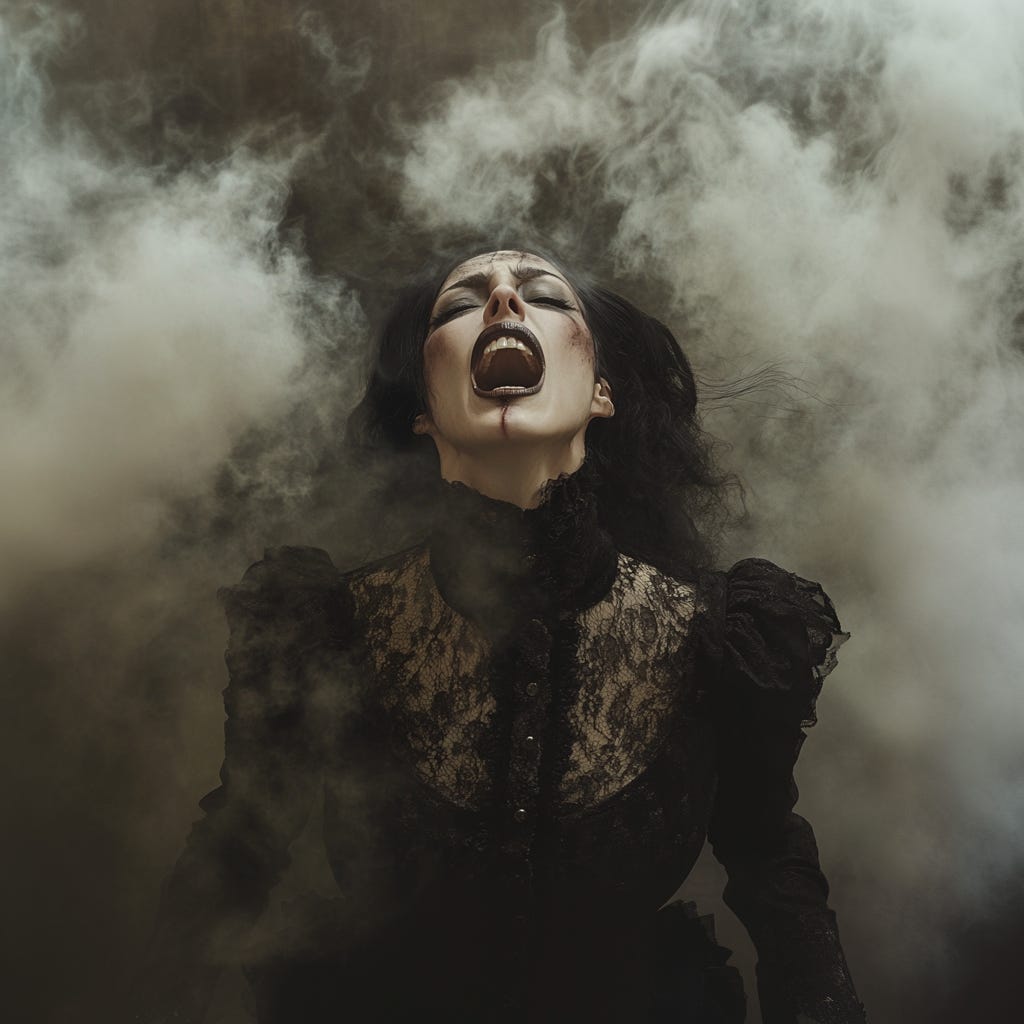
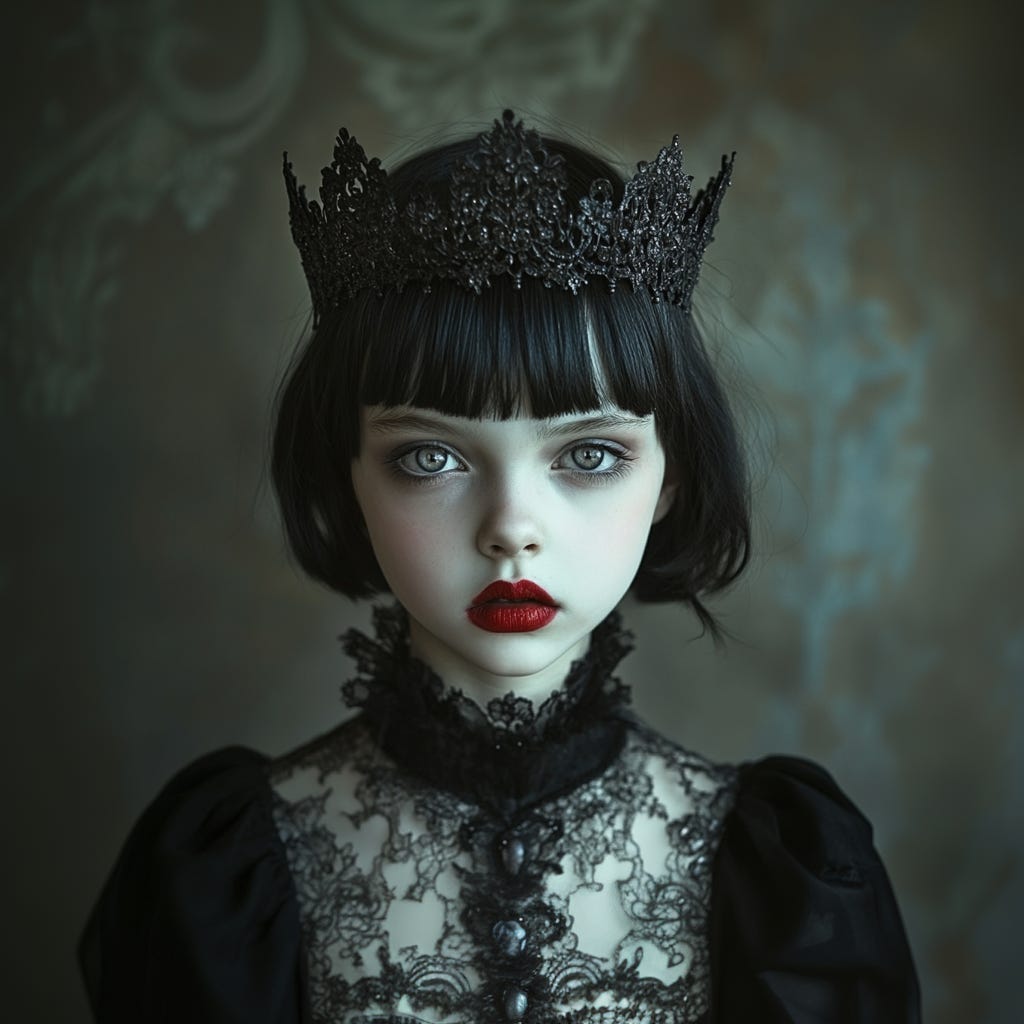
Good job this has to be my favorite version of Snow White now
Fine work, Daniel. 👏